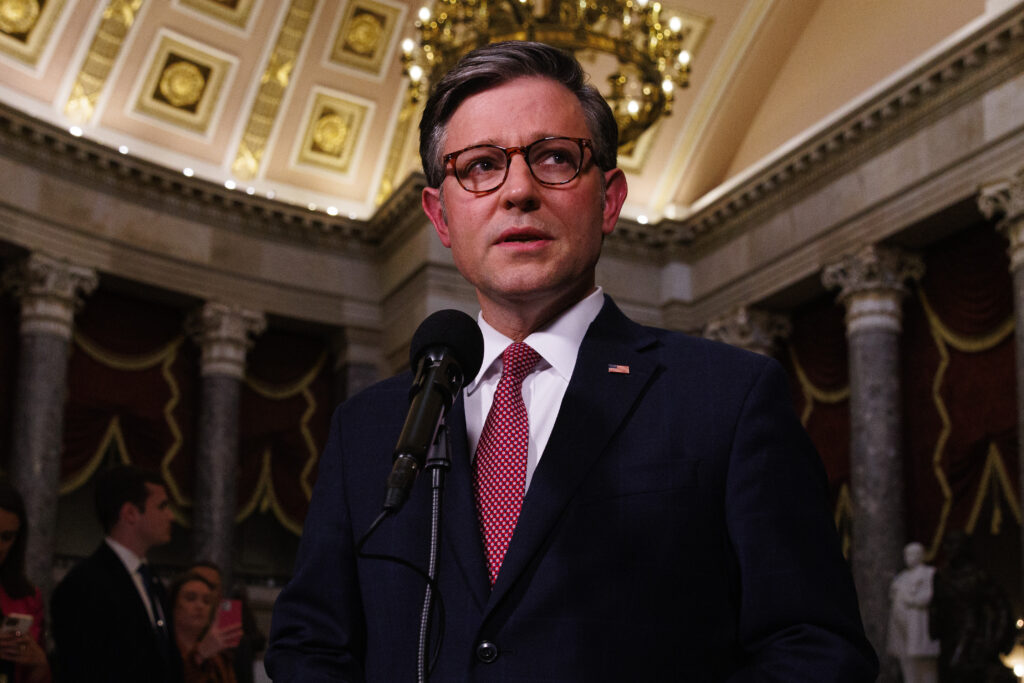It’s tempting ahead of this weekend’s decisive US House of Representatives vote on additional aid to Ukraine to quote Winston Churchill’s aphorism: “Americans will always do the right thing, once they have exhausted all other possibilities.”
There are two problems with that proposition: First, Churchill scholars can’t show evidence that the legendary British statesman and orator ever said that, though there’s proof that he felt it often enough. Second, it’s by no means clear that House Speaker Mike Johnson can rally his unruly ranks to do the right thing—with the extreme right threatening to oust him and Democratic votes required for success.
Even if Johnson does succeed, the Biden administration still needs to release the weapons Ukrainians most urgently need to turn the tide, with permission to use them deep into Russia. It’s right to praise the Biden administration for its consistent support of Ukraine since 2022, even while questioning its reluctance to provide Kyiv with the full range of weapons that it needs faster and in sufficient quantity.
“Will America Let Ukraine Collapse?” the lead Wall Street Journal editorial asked in Thursday’s paper. It was accompanied by President Joe Biden’s op-ed appealing for congressional support for “urgent national-security legislation” supporting Ukraine and Israel, and providing humanitarian aid to Palestinians in Gaza.
The latest news update is that a faction of House Republicans, led by Georgia’s Rep. Marjorie Taylor Greene and Kentucky’s Rep. Thomas Massie, is threatening to oust Johnson over the vote. This group, says the Wall Street Journal editorial, believes it can then “return without consequence to pounding Joe Biden about the crisis at the southern border. They are wrong, and the sad irony is that such delusions about the world are usually reserved for the progressive left.”
Determining the “outlines”
For that errant minority to understand how deeply US interests are linked to Ukraine’s ability to resist Moscow, it’s worth reading the Washington Post’s front-page scoop Thursday on a secret 2023 Russian Foreign Ministry document.
Provided to the paper by a European intelligence service, it codifies efforts by Russian President Vladimir Putin’s government to leverage the Ukraine war to “forge a global order free from what it sees as American dominance,” writes reporter Catherine Belton.
The document is a secret addendum, dated April 11, 2023, which was later added to the blander, published official document of March 31, entitled “The Foreign Policy Concept of the Russian Federation.” The addendum says the outcome of Russia’s war in Ukraine will “to a great degree determine the outlines of the future world order.”
The documents are all the confirmation the United States and its allies should need to show that Russia is actively working to disrupt domestic politics in the United States and other countries that support Ukraine. At the same time, Russia is working to shift the global balance of power through closer relations with China, Iran, North Korea, and other like-minded nations.
With the stakes this undeniably high, any dithering in support for Ukraine is geopolitical malpractice.
“Can we hold our ground?”
The situation couldn’t be more urgent, with Russia’s full-scale invasion of Ukraine entering its third summer. Putin plans to press his growing advantage with a major offensive to achieve as much gain as possible while the United States is distracted by its upcoming elections. He’s calculating that a re-elected President Donald Trump will be less willing to continue military and financial support for Ukraine.
Ukraine’s top military commander, General Oleksandr Syrsky, said in a statement last weekend that the Ukrainian army’s positions on the eastern front have “worsened significantly in recent days.” Russian forces are pushing hard to take advantage of Ukraine’s shortages of ammunition, air defenses, and well-trained troops.
Speaking in Kyiv to visiting PBS NewsHour anchor Amna Nawaz this week, Ukrainian President Volodymyr Zelenskyy laid down the stakes for this weekend’s congressional vote. “I can tell you, frankly, without this support, we will have no chance of winning,” he said.
He explained that Ukraine’s ratio of artillery shells to that of Russia is one-to-ten. “Can we hold our ground?” Zelenskyy asked Nawaz. “No . . . they will be pushing us back every day.”
He drew an uncomfortable contrast between military support for Ukraine and for Israel, both non-NATO countries, following the remarkable allied success in defending Israel from last weekend’s Iranian barrage.
“Israel, by itself, wouldn’t be able to protect against such a numerous, powerful strike,” he said, later adding, “Israel is not a NATO country. The NATO allies, including NATO countries, have been defending Israel. They showed the Iranian forces that Israel was not alone.” His point: NATO countries should also be able to more actively defend Ukraine as well.
Anne Applebaum, writing in the Atlantic, explains differently why European and US forces scramble to defend Israel but not Ukraine. Russia’s threat of using nuclear weapons “has made the US and Europe reluctant to enter the skies over Ukraine.” Israel is also a nuclear power, but that cuts differently, as “the US, Europe, and even some Arab states are eager to make sure Israel is never provoked enough to use” a nuclear weapon against Iran.
More to the point, she writes, while Republican legislators and politicians have been impervious to Iranian propaganda, they have been more sympathetic to Russia, up to and including their presidential candidate, often repeating Moscow’s talking points.
Coming back to Churchill, one quote that is accurate came from a letter he wrote to his brother about the United States: “This is a very great country my dear Jack. Not pretty or romantic but great and utilitarian. There seems to be no such thing as reverence or tradition. Everything is eminently practical, and things are judged from a matter of fact standpoint.”
The facts demand that the US House act this weekend to approve some sixty billion dollars of military and other support for Ukraine. The facts also demand that the Biden administration, without whom Kyiv would not have been able to defend itself so effectively thus far, release many of the restrictions on the sort of weapons provided and their use.
Putin has made clear, through the secret memorandum reported in the Washington Post, and beyond, that he understands the stakes in Ukraine. He has no chance of victory if the United States and its European allies, which have economies and defense budgets multiple times the size of Russia’s, act in common cause, understanding the historic moment.
As Biden wrote in Thursday’s Wall Street Journal: “Mr. Putin has tried relentlessly to break the will of the Ukrainian people. He has failed. Now he’s trying to break the will of the West. We cannot let him succeed. There are moments in history that call for leadership and courage. This is one of them.”
Frederick Kempe is president and chief executive officer of the Atlantic Council. You can follow him on Twitter: @FredKempe.
Further reading
Mon, Apr 15, 2024
Organizing for victory
UkraineAlert By
In the escalating struggle against Putin's Russia, Iran, and China, The West needs a return to the clarity of Churchill and Roosevelt, who communicated clear strategic priorities to the public, industry, and the military, writes Ben Hodges.
Fri, Apr 12, 2024
Dispatch from Kyiv: Ukraine is fighting for its economic survival, too
New Atlanticist By Olga Khakova, Charles Lichfield
The longer the war lasts, the more it will consume funds initially meant for long-term investments and reconstruction.
Thu, Apr 11, 2024
Ukraine pleads for Patriot air defense systems as Russia destroys power grid
UkraineAlert By Peter Dickinson
Officials in Kyiv are calling on partners to urgently supply Patriot systems as Russia capitalizes on Ukraine's weakening air defenses to methodically destroy the country's power grid, writes Peter Dickinson.
Image: Speaker of the House Mike Johnson (R-LA) holds a press conference in Statuary Hall in the Capitol Building in Washington, DC on April 17, 2024. Speaker Johnson spoke about impeaching Secretary Mayorkas and pending Ukraine aid. (Photo by Aaron Schwartz/Sipa USA)



